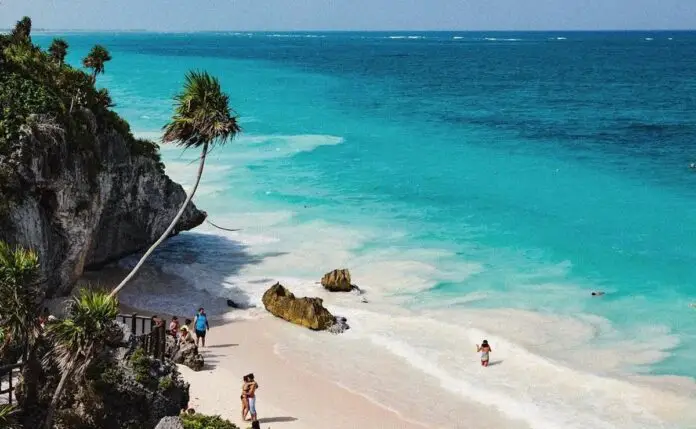Residents of Tulum, Mexico are calling on authorities to guarantee free access to public beaches, a right enshrined in the Mexican Constitution and reinforced by the General Law of National Assets.
For years, local communities, tourists, and private developers have faced obstacles that hinder access to these iconic destinations. The citizen organization Playas Libres has spoken out against what it considers unfulfilled promises by state and municipal authorities to ensure free public access.
The movement, which has gained momentum in recent days, seeks the intervention of the local Congress to resolve a problem that affects both residents and tourists. In response to these demands, Playas Libres submitted a request to the Tourism Commission of the 18th Legislature for an urgent resolution to postpone the charge for access to Jaguar Park and ensure free entry to beaches without any hindrance from private individuals.
The presidential Jaguar Park project has imposed entrance fees and limited public access in the hotel zone, generating discontent among residents and local economic sectors. According to Cinthia Peraza, a representative of Playas Libres, the situation is “pure atole with the finger,” reflecting the community’s disappointment over promises that have not materialized.
Despite meetings with municipal officials, progress has been minimal, leading citizens to seek support from the Tourism Commission. Among their main demands are the suspension of the access fee to Jaguar Park until free entry to beaches in the hotel zone is guaranteed and for Congress to issue an urgent resolution to address this issue.
The conflict not only affects access to beaches but also the local economy, with tourism service providers reporting losses due to decreased visitors. Roadblocks carried out by disgruntled tourists have highlighted the seriousness of the situation.
Meanwhile, residents continue to organize to demand concrete solutions and ensure that beaches are accessible to all. This citizen movement represents a fight for collective rights and the preservation of one of the region’s main tourist attractions.
In October 2020, a decree was published in the Official Gazette of the Federation that amended Articles 8 and 127 of the General Law of National Property and added Article 154. These amendments establish that access to beaches cannot be restricted, hindered, or conditioned except in specific cases defined by regulations.
Landowners adjacent to the federal maritime-terrestrial zone are required to allow free transit to beaches through agreements with the Ministry of Environment and Natural Resources (Semarnat) to define public access. The reforms also introduced severe penalties for those who impede beach access, including fines ranging from 3,000 to 12,000 times the Unit of Measurement and Update (UMA).
Despite these legal advances, free access to Mexican beaches remains a contentious issue. In tourist destinations such as Tulum and Mazatlán, cases of private individuals closing public access points have been reported, sparking protests and citizen mobilizations.
These practices not only affect local residents but also tourists who face restrictions on enjoying spaces that, by law, are for common use. Semarnat has worked in coordination with local authorities to restore public access and ensure compliance with the law. However, resistance from some private developers and a lack of adequate infrastructure for public access have hampered its effective implementation.
Guaranteeing free access to beaches is not only a constitutional right but also a strategy to promote equity and sustainability in tourism development. Organizations such as Playas Libres have played a crucial role in defending public access to beaches, promoting awareness-raising campaigns and demanding congressional intervention to ensure that laws are effectively enforced.
Source: Diario Imagen




